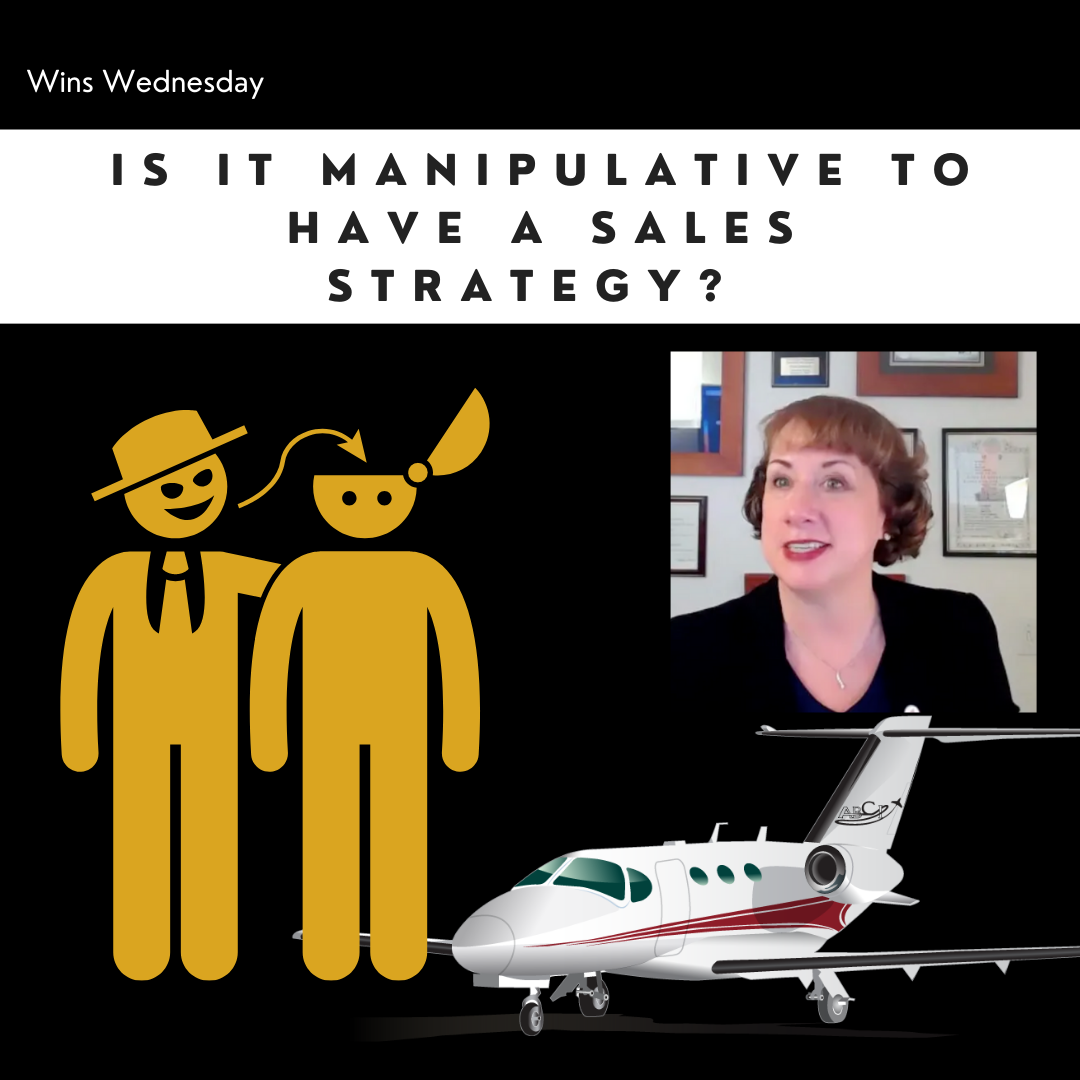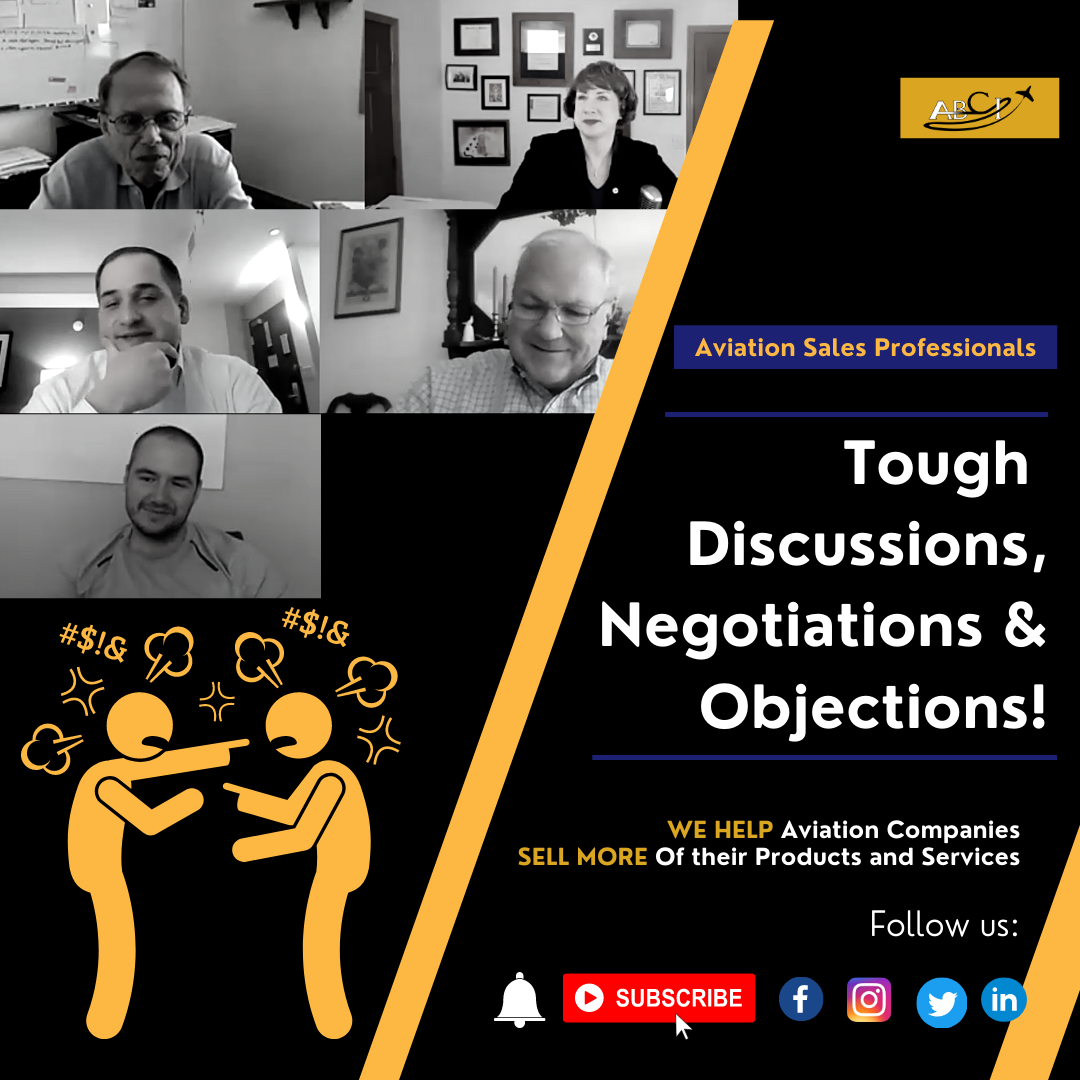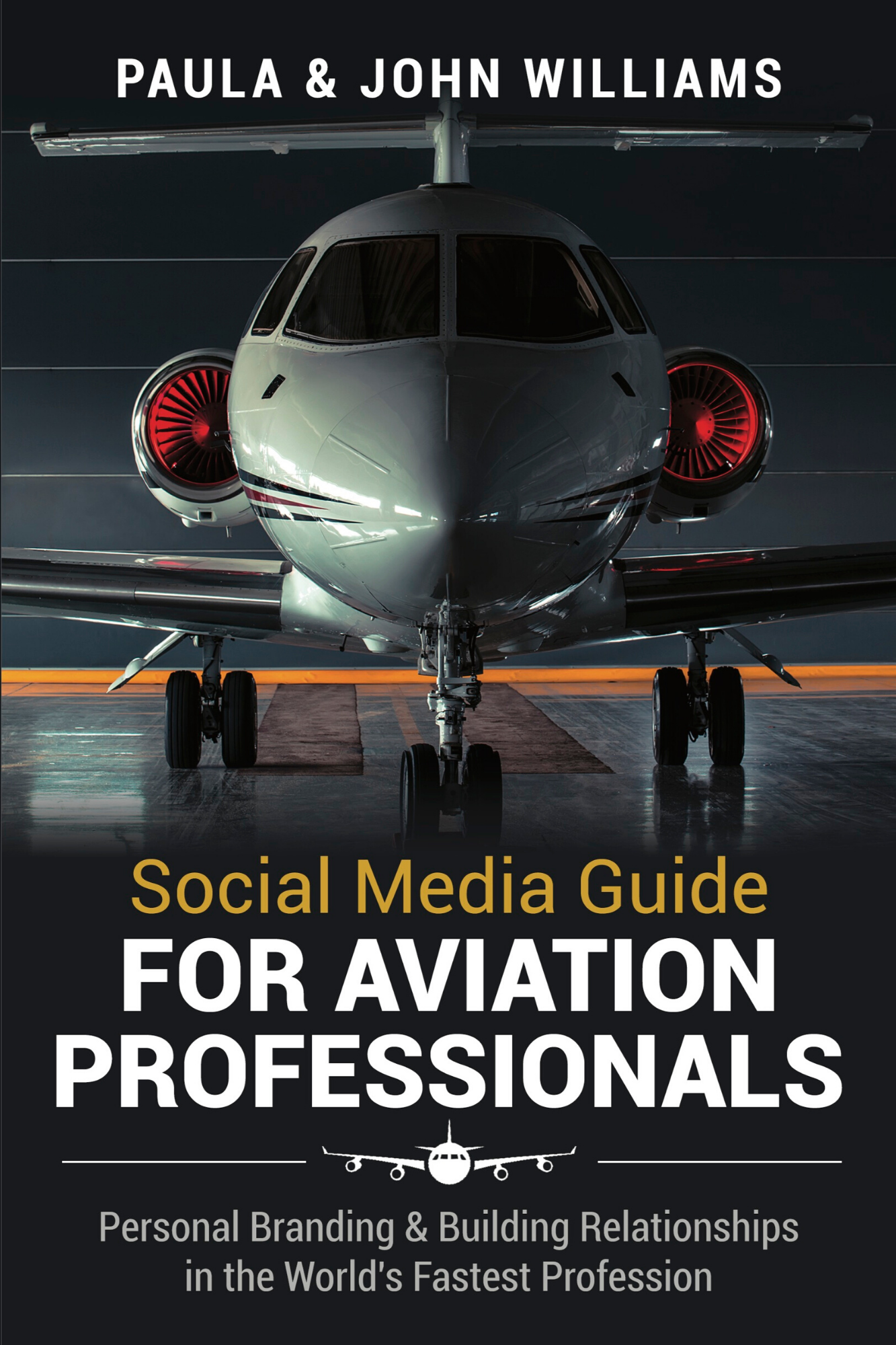We discuss three different sales scenarios and the one success factor that was common to all of them. Plus, how to make this work for you!
[embedyt] https://www.youtube.com/watch?v=KkebICT3BD4[/embedyt]
Transcript – How to Win Aviation Sales
 Paula Williams:
Paula Williams:
Welcome to this week’s episode. Today we are talking about sales, aviation sales in particular.
John Williams:
Exactly.
Paula Williams:
Which is a, hopefully, natural result of aviation marketing.
John Williams:
Well, it can help.
Three Sales Scenarios – Two Aviation, One Not
Paula Williams:
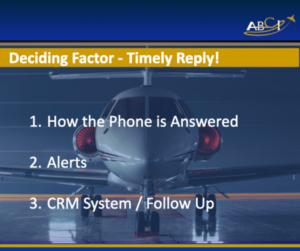 Exactly. We’ve got three scenarios, both of which were won or lost by the same factor. Right?
Exactly. We’ve got three scenarios, both of which were won or lost by the same factor. Right?
John Williams:
That wouldn’t be a truism.
Paula Williams:
Or at least the same set of factors.
John Williams:
Yes.
Introductions
Paula Williams:
All right. I’m Paula Williams.
John Williams:
I’m John Williams.
Paula Williams:
And we are ABCI, and ABCI’s mission is…
John Williams:
To help all you folks out there in the aviation world sell more of your products and services.
Paula Williams:
Exactly. Even though we are a marketing company, our mission is sales, which is not always the case. We’re not in it to win awards, or Webbies, or Clios or anything else. Our award really is when our clients make more sales.
John Williams:
That’s exactly correct.
What Do These Situations Have in Common?
Paula Williams:
All right cool. Okay. We have three scenarios to talk about. Two of which are aviation. One of which is not aviation, but all three of them have the same factors and all three of them included one thing in common, and that is this man right here as the customer. One thing that I really enjoy about working with John is that he is a fabulous aviation customer. He’s the perfect demographic. He has the perfect mindset, the perfect everything to test scenarios on, so if it floats with John, then it probably won’t be too bad with the rest of the world. Right?
John Williams:
Whatever you say.
Paula Williams:
Okay. All right. In each of these scenarios, I want you to listen to three things. John’s going to tell you the story, but the things that I want you to listen for in each of these stories is number one, how was the phone answered on the first contact? Number two, how were alerts handled or how do you think alerts may have been handled by the company that was handling this call? Number three, did they use a CRM system or some type of a followup system? In the story that John’s going to tell from the customer’s perspective, right?
John Williams:
I don’t know about story.
Paula Williams:
Well, okay.
John Williams:
An experience, anyway.
Story #1 – Our “Home Studio” Construction
Paula Williams:
The anecdote. Okay. Anecdote number one.
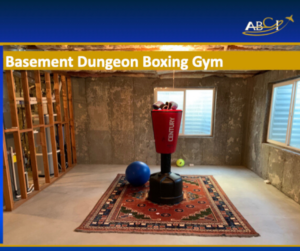
John Williams:
Well, if you can’t see the picture, we decided that it’s time to build the president of this firm a proper studio.
Paula Williams:
That would be me.
John Williams:
That’s exactly right. The first thing we had to do is to hire somebody to frame out the studio. I went to the local Home Depot place and they said here’s an 800 number, call us for anything, so called them, and not only did they not know what I was talking about, their grasp of the English language is tenuous at best. After about five minutes, I just said, “No thank you,” and hung up.
Paula Williams:
Right? This is a fairly simple job to start with. This is taking our basement dungeon boxing gym. If you can’t see the picture, it is an unfinished basement basically, and you can see the water heater back there, and you can see the window wells and all of the fabulous basement features. What we want to do is take this and frame it and make it into a home office/studio kind of a deal.
John Williams:
Yeah. Not that tough of a question actually. On the way out the door, at what they call the pro desk, just out of curiosity, I stopped by and said, “Do you know anybody that you would consider for framing a basement?” The guy said, “Just a moment,” and he came back with a list of three folks. I said, “Great.” I got three names, phone numbers, company names. The following Monday I called all three. The first one said, he’d be back with me that afternoon. The second one said nothing.
Paula Williams:
Did they answer the phone at all?
John Williams:
They didn’t even answer the phone.
Paula Williams:
It went to a voicemail?
John Williams:
Yes, and I left a message.
Paula Williams:
Okay.
John Williams:
The third one answered the phone and said, “He could be out there between 3:00 and 3:30, is that okay?” I said, “Absolutely.” The one that said they’d get back to me that same afternoon, didn’t. The second one that said they would return my phone call, didn’t to this day. The third one showed up out here. Quite a nice, well knowledgeable, been in the experience for 20 years, and as a professional, he did what I’d expect, which is to, “Oh yeah, we can do this,” and he said, “you might want to do this instead of that,” and made great suggestions, which we took most of. He’s coming soon. I hired him, paid him half the stuff, and he’s got to come out here and do it. That’s just crazy. I told him, and in fact, he asked, he said, “How did you hear of me?”
Paula Williams:
Mm-hmm (affirmative).
John Williams:
I explained what I just said to you guys, and he just shook his head. He said, “Well, that’s why I always answer the phone.”
Paula Williams:
Right. Exactly. Or at least return a call. Right?
John Williams:
Right. Then he said he’d follow up with a text, and he did. Then 3:15 that afternoon he was here.
Paula Williams:
Fantastic.
John Williams:
And the rest is going to be history.
Paula Williams:
Exactly. We’ll post as we go forward with the studio, the evolution of the basement dungeon boxing gym to the ABCI studio as we go through this.
Story #2 – Aircraft Hangar/ Airport Facilities Project
 John Williams:
John Williams:
Mm-hmm (affirmative).
Paula Williams:
That will be fun. Fun to see. But this was really instructive, I think, in the sense, even though it wasn’t aviation, it still had a lot of the same factors, but the next story is aviation, right?
John Williams:
Yes. It seems as though I’m helping a client try to find a place to rent/buy/build a hangar. I have called people all over west of the Mississippi, looking for hangar space. Some refuse to call me back. Some says, “Oh, what’s the name of your company, and how big are you? What’s your tail number?” I said, “It’s none of your concern. I want to know, before you know anything about me, I need to know about you. Tell me what facilities you have available. If they’re not available, do you have land I can build on? If you don’t have land I can build on, can I at least rent/ lease?” Refusals by 99% of all of those people that supposedly had hanger space.
Paula Williams:
Mm-hmm (affirmative).
John Williams:
I talked to one gentleman and said what I was after, and he said, “That’s exactly the kind of business we want here,” and he told me enough of what I needed to know. “We have land available to be built-on,” and we’ve been negotiating and I’ve called him back because of this thing that’s going around, this virus. I said, “I know that steel prices are down, so I’m supposing it’s concessional to steel prices?” He said, “Absolutely.” The guy’s just phenomenal.
Paula Williams:
That’s fantastic.
John Williams:
Yep.
Paula Williams:
He qualified you around the confidentiality that you had, so he was able to figure out that you were for real, without asking you any questions you couldn’t answer.
John Williams:
Yeah. I mean, tail number, well, which one, how many? I mean, don’t talk to me like that. They want to go out and then try to qualify me, see if I can afford it.
Paula Williams:
Exactly.
John Williams:
I’m not the customer.
Paula Williams:
Right. There’s a lot of folks in the aviation industry who are doing business in this way. That have signed nondisclosure agreements and can’t necessarily tell you everything that you want to know. That is very, very common and not necessarily a disqualifying factor. There’s other ways of deciding whether or not you’re wasting your time.
John Williams:
Absolutely. Mm-hmm (affirmative).
Paula Williams:
Okay. Totally get that, totally sympathize, but dang, lost a sale,
John Williams:
Lost a huge sale. It looks like we’re going to… My client’s going to spend about 35 million on a hanger and facilities.
Paula Williams:
Mm-hmm (affirmative), and you still won’t tell anybody Who he is.
John Williams:
Nope.
Paula Williams:
Absolutely not. Otherwise you’d never get another client. Right?
John Williams:
Exactly. That’s what NDAs are all about.
Story #3 – Aircraft Charter Project
 Paula Williams:
Paula Williams:
Right. Okay. The next scenario, and third and final scenario for the day.
John Williams:
I’m with the NBAA, and I had been-
Paula Williams:
At the convention last year.
John Williams:
At the convention last year, and I had been requested by a client to set up a charter.
Paula Williams:
Mm-hmm (affirmative).
John Williams:
None, no charter company at NBAA would talk to me. I mean, I told them what I wanted. They said, “No, we can’t do that,” or “Talk to so-and-so, it’s not my part.” They basically didn’t say, “Not my job,” but said that. I mean, this guy is going to be spending between a hundred and $120,000 for a week’s worth of flying, and they don’t talk to me. They looked at me and think… I don’t know what they think, actually, but they decided I wouldn’t have the money, and it was not my money.
Paula Williams:
It’s not about you.
John Williams:
No, it isn’t.
Paula Williams:
Right. That’s a…
John Williams:
I finally found a charter company that would be willing to do what I expect and guarantee… Put guarantees in place, so they could be on call for whatever this one week of flying these guys want to do. It’ll be all over the freaking place, so they’re good.
Paula Williams:
Part of this is just that a lot of people are stuck in a mode of doing business that’s dictated by their policy or whatever, and they’re not able to break that?
John Williams:
I don’t know what. I mean, it’s hard to tell what’s in people’s minds.
Paula Williams:
Oh, yeah.
John Williams:
But I can tell you that a lot of business is being lost because of attitudes that I have seen.
Paula Williams:
Mm-hmm (affirmative). I think in a lot of cases, it’s just not getting escalated to the right people to make a decision about this. It’s at a level where they’re not able to make a decision and they don’t want to escalate it for whatever reason, to somebody who actually has some flexibility. Right?
John Williams:
They at least.
Paula Williams:
Okay.
John Williams:
At least.
Paula Williams:
Cool.
John Williams:
Actually, it was quite disappointing in all three and two of them are in aviation.
Your Most Important Job as a Salesperson – A Timely Reply!
 Paula Williams:
Paula Williams:
Right. It is so hard to be a customer these days. The nice thing about that is that it’s so easy to be a salesperson these days, you just have to get this one thing right. Just one thing. Right?
John Williams:
Yep. Easy.
Paula Williams:
You have one job and it is not an easy job necessarily, but it is a simple job.
John Williams:
Well, one is answering the phone.
Paula Williams:
Yeah, exactly. So the deciding factor in all three of those cases was a timely and educated reply. Right?
John Williams:
Exactly. It’s just like it was in real estate several years ago. You don’t know what people can or can’t afford by the way they dress.
Paula Williams:
Mm-hmm (affirmative). Well, it’s not like you were dressed like a slob at NBAA.
John Williams:
Well no, but I had that experience when I was trying to buy a house in different places. They would look at me and say… Finally, I got to the point where I said, “Look, I’m going to pay cash on this thing. I don’t care what you want to do. We’re not going to go through closing unless I can pay cash. If you’re interested, that’s fine, otherwise, I’ll just turn around and walk out the door.” Then they, all of a sudden, they got really interested, because they think I have money.
Paula Williams:
Right.
John Williams:
Well, when you buy something, you’re going to pay cash. It’s not necessarily your own.
Thing Number One – Answer the Phone!
Paula Williams:
Right. That’s true. Okay. Three things that I recommend as a sales consultant, and someone that does sales training. Thing number one often is, how is your phone answered?
John Williams:
Or is it answered.
Paula Williams:
Right. We can do the most expensive marketing ever done, ever made and still lose sales, because either the phone isn’t answered, or it’s answered by a robot, or worse answered by a phone tree robot. Press one for Spanish, press two for English. Making people go through that scenario is just not realistic in the aviation industry.
John Williams:
We had a customer did that a long time ago, where we marketed for them, and they said they weren’t getting any leads. Come to find out they weren’t making any calls on the leads they had.
Paula Williams:
Exactly. Or nobody was answering their phone.
John Williams:
And that too.
Thing Number Two – Alerts!
Paula Williams:
Right. Their phone tree was number one, unwelcoming; number two, kind of broken, because when it did go to voicemail, it was really hard to retrieve the voicemails. They replaced their phone system and things got better, pretty rapidly.
We use a service, because we can’t be on the phone 24/7, and we are not a huge company, so we do use a service where a human being answers the phone during business hours in the United States. The rest of the time you do get a recording, but we do return those as soon as we can.
John Williams:
But those are only after our business hours.
Paula Williams:
Right. Anytime you call us during business hours, you will get a human being, and I’d recommend that if you are in an industry where your average sale is over a thousand dollars, you can afford to have somebody answer your phone. It doesn’t necessarily have to be somebody that sits in your office.
John Williams:
No.
Paula Williams:
There are creative ways of handling this. We use a company called Call Ruby. We don’t take any commission or anything like that from them, but they’ve done a really good job for us for a couple of years now.
How your phone is answered is a huge deal. Make sure they’re smart enough to escalate appropriately, right? Make sure that they are able to screen your calls in a way that isn’t going to preclude somebody that is a potential customer.
John Williams:
We give them a script, but they don’t follow it strictly, which is good.
Paula Williams:
Yeah.
John Williams:
They sound like they work for us, actually.
Paula Williams:
Oh yeah. We give them an entire sheet of the most common things that people call about, and they’re intelligent enough to really manage that well for us. They do a really good job.
Thing number two is alerts. When someone leaves a message, what happens to that? Does it sit in a machine until you get around to getting that? Are you alerted in some way? Call Ruby will send us a text to our phone, or to my watch when someone wants to speak with us and they think it’s important, so that’s something that I can get to right away. There are systems for just about every phone system, whether it’s manned by a human being or whether it’s manned by a machine, where you can set up some kind of an alert system that handles that. That’s something we do a lot in office hours, is help people set those up and set up the rules for those, so that they’re screening their calls properly without getting inundated, but without letting something slip through the cracks.
John Williams:
True.
Thing Number Three – Use Some Kind of CRM and Follow Up Process
Paula Williams:
Cool. Number three, a CRM customer relationship management system and follow up process. This doesn’t have to be software, although there’s great software on the market, this could be a whiteboard. This could be-
John Williams:
A piece of paper.
Paula Williams:
… your Franklin Planner, this could be a little 99 cent notebook from the drug store. You do need to make sure that you do follow up with people, and ideally follow up quickly, because they may not get your return phone call. You may have to return a call more than once. The burden of effort is on your side, if you’re the one making the sale. You don’t just say, “Well, they never got back to me.” It’s not their job to get back to you. It’s your job to get to them.
Those three things, and they are the hardest things in the world to do. I totally get that, but if you can fix those three things, you’re going to make a heck of a lot more sales, right?
John Williams:
Yep.
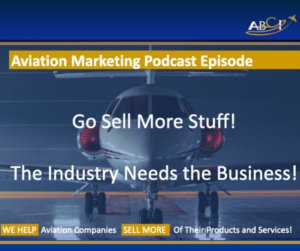
Paula Williams:
Okay. All right. Go sell more stuff.
John Williams:
Industry needs the business.
Paula Williams:
Absolutely. It’s a paraphrase from Zig Ziglar, right?
John Williams:
Absolutely.
Paula Williams:
All right. Have a great week. See you next time.
John Williams:
See you next time.



